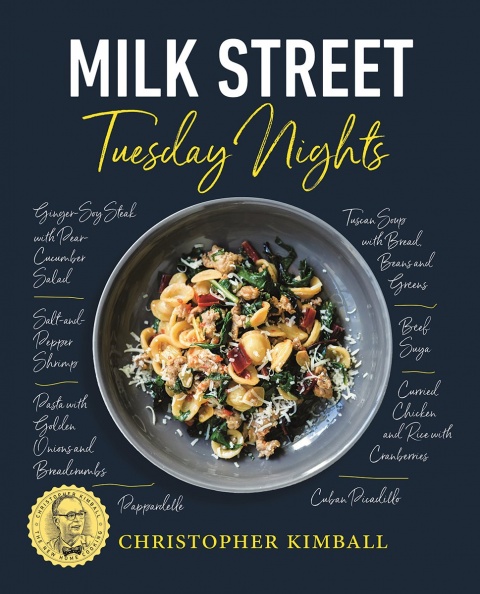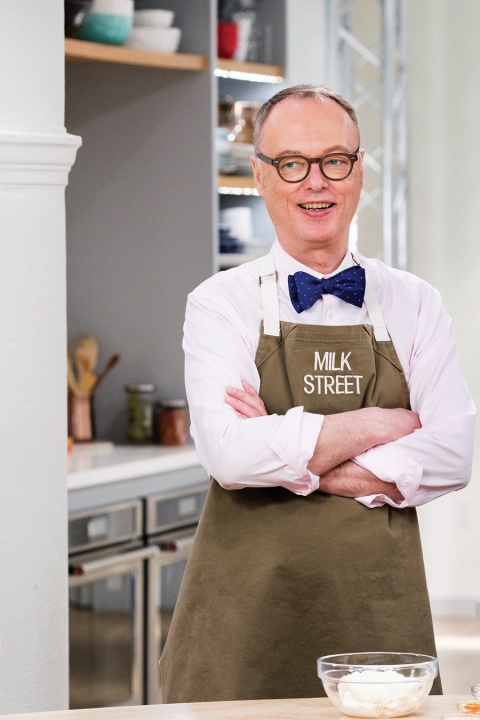Columbia College | Columbia University in the City of New York
Cooking Made Easier with Milk Street

Christopher Kimball ’73 wants to change the way you cook. The former editor-in-chief of technique-heavy Cooks Illustrated is now promoting simplicity; his new cookbook, Milk Street Tuesday Nights: More Than 200 Simple Weeknight Suppers That Deliver Bold Flavor, Fast (Little, Brown and Co., $35) is focused on ingredients, not time or tactic.
“The Milk Street approach — start with big flavors, end up with big flavors — lends itself to Tuesday night cooking,” Kimball says. “Time is not an essential ingredient in a lot of these recipes. Put a spice rub on a pork tenderloin and cook it in a pan for eight minutes — the trick is what spices you use; you don’t have to spend an hour making a pan sauce. It’s very simple.”
Some chapters of Tuesday Nights focus on speed, featuring recipes that are Fast (from start to finish in under an hour), Faster (45 minutes or less) and Fastest (25 minutes or less). A 20-minute cacio e pepe calls for only black pepper, corn starch, pasta and fresh pecorino Romano. Other chapters highlight themes, like Supper Salads, Easy Additions and Pizza Night. “For those of us raised on classic American cookery, heavily influenced by the cuisines of Northern Europe, this is a watershed moment,” the book’s introduction reads. “This is how the rest of the world cooks.”

Photo courtesy of Christopher Kimball’s Milk Street
Kimball started Milk Street in 2016, soon after leaving the company he co-founded, America’s Test Kitchen. Named for its Boston address (the birthplace of Benjamin Franklin!), Milk Street includes a magazine, books, a cooking school, and television and radio programs.
“My cooking had started to change a few years before I started Milk Street,” Kimball says. “I travel a fair amount and I began to realize that many parts of the world don’t cook anything like Northern Europe. Traditional Northern European recipes take fairly bland ingredients like potatoes, meat and dairy, and with a lot of technique, time and heat you slowly build flavors. Mastering the Art of French Cooking was my tome for years — there’s no spices in it. That kind of cooking is great but there are other ways of looking at it.
“Other regions use wildly different flavors in a dish, like lemongrass, ginger, fish sauce — there’s a lot of contrast of flavors, a lot of spices, a lot of contrast of textures. It’s a whole different way of thinking about what cooking is, what taste is. I find it’s a much more appealing way to cook now. We’re trying to bring some of that back and adapt it to this country.”
His favorite recipe from Tuesday Nights is the Turkish Red Lentil Soup. “At the end you take some oil and a little Aleppo pepper, infuse it in the oil in two or three minutes and drizzle it over the soup,” Kimball says. “The thing I like about it is that something basic like red lentils can pretty quickly be turned into something great just by adding a little bit of flavor contrast.”
You could say Kimball’s time at the College had flavor contrast as well: “It was probably the worst time of all to be in New York City, but I loved it,” he says. An art history major, he needed to learn German to read original manuscripts, so he drove a cab on the weekends to earn the money to spend the summer in Salzburg. “The city was tough, but it was a great experience. There were a lot of cool inexpensive restaurants. My friend’s girlfriend’s brother was the drummer for The Velvet Underground. I saw the Grateful Dead at the Fillmore East.”
Kimball believes that by taking a world view, home cooking is starting to change similarly to the way music, architecture and fashion have evolved. “Bob Marley is one type of reggae but there are hundreds of kinds of reggae throughout the world,” he says. “Food is going to go through the same revolution — you’re going to find all this melding and coming together. I think we’re at the beginning of this, so my hope is that Milk Street can play a role. I think it makes cooking easier and more fun, and you should enjoy your time in the kitchen.
“Cooking is becoming one of the last things you can do with your hands; it’s immediately appealing and it’s something you can do for other people, as well,” Kimball adds. “It’s an expression of yourself, it’s giving and it has immediate benefit — you don’t have to wait 10 years to see if something’s going to turn out. So I think the idea that cooking is drudgery is soon going to be old news.”
Issue Contents
Published three times a year by Columbia College for alumni, students, faculty, parents and friends.
Columbia Alumni Center
622 W. 113th St., MC 4530, 6th Fl.
New York, NY 10025
212-851-7852
cct@columbia.edu
Columbia Alumni Center
622 W. 113th St., MC 4530, 4th Fl.
New York, NY 10025
212-851-7488
ccalumni@columbia.edu

